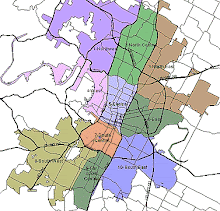 In Austin, there is a tendency to believe that there are enough jobs for everyone. This, in fact, is true. The challenge in Austin, however, is the ability to distinguish between what is a liveable job, and what is a "supplemental income" job. A liveable job is a job that allows two things: 1) financial stability, in which one is able to save, pay all bills, and potentially purchase a home; and 2) personal freedom, or the idea that one should be able to choose to ride a bus, have a roommate, go to additional schooling, participate in community activities, etc. Most of these jobs are located in many of the fields that Austinites do not practice: technology (no, not everyone is a "techie"), healthcare (more people, but takes a lot of education, and so not many), and law (that's lawyers, not support staff).
In Austin, there is a tendency to believe that there are enough jobs for everyone. This, in fact, is true. The challenge in Austin, however, is the ability to distinguish between what is a liveable job, and what is a "supplemental income" job. A liveable job is a job that allows two things: 1) financial stability, in which one is able to save, pay all bills, and potentially purchase a home; and 2) personal freedom, or the idea that one should be able to choose to ride a bus, have a roommate, go to additional schooling, participate in community activities, etc. Most of these jobs are located in many of the fields that Austinites do not practice: technology (no, not everyone is a "techie"), healthcare (more people, but takes a lot of education, and so not many), and law (that's lawyers, not support staff).Much of Austin is consumed with what I will call the "supplemental income" job. These jobs are positions that 1) do not require much schooling, but the hiring department is frequently impressed by schooling; 2) do not offer many marketable skills which allow people to get promoted or transition to other careers; and 3) do not pay very much. The reason that I name them "supplemental income" jobs is that they are mostly taken by women, and the idea is that there is another income, a spouse, that makes the real money. Young people of both sexes are starting to make up these positions, and therein lies the problem.
While it is good to have a number of positions that are available, Austin looks antiquated when determining that some positions are worth so much less than others. Administrative assistants do quite a bit of work running an office, but only executive assistants get a living wage. Cashiers are, perhaps, the most important people in a restaurant because they make sure people get the money to be paid, but cashiers make little money. All careers start at entry-level, but too many entry-level jobs require experience. Nowadays, I see paralegal positions, which are executive assistants to attorneys, being offered $9-11 an hour, and those jobs require experience or, often, a certificate.
Austin needs to recognize that it needs new ideas to mesh with the old ideas. There can only be so many cheap employers before the city realizes that it's starving its own economy. I think the only reason people want to continue to think of Austin as a "cheap" city is to keep wages low. One thing that can be said about many of the new businesses is that they create more liveable jobs. It's better to have people living in the city and contributing than it is to say, "We have lots of jobs," and none of them support a household. Not to mention that as the city transitions to a more dense environment, those "supplemental income" jobs will not pay the cost of living, even without a car payment.
If you want a graduate, check the debt for today's graduate, and then decide your salary, because too many people are choosing to stay in school rather than face bad jobs that don't pay enough for people to live. If you want experience, ask yourself why someone who has experience doing something elsewhere has experience with you. Most companies, departments, etc. have their own software and their own procedures, and just because someone did anything at another company doesn't mean that person is better than someone who can be trained for the job they're in, rather than the job they had. If your position is in a remote location, don't scrimp on the salary, because people most likely have to drive to get there, which means a car, gas, insurance and maintenance, and most people don't own their own cars.

No comments:
Post a Comment